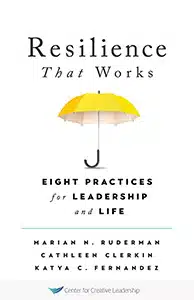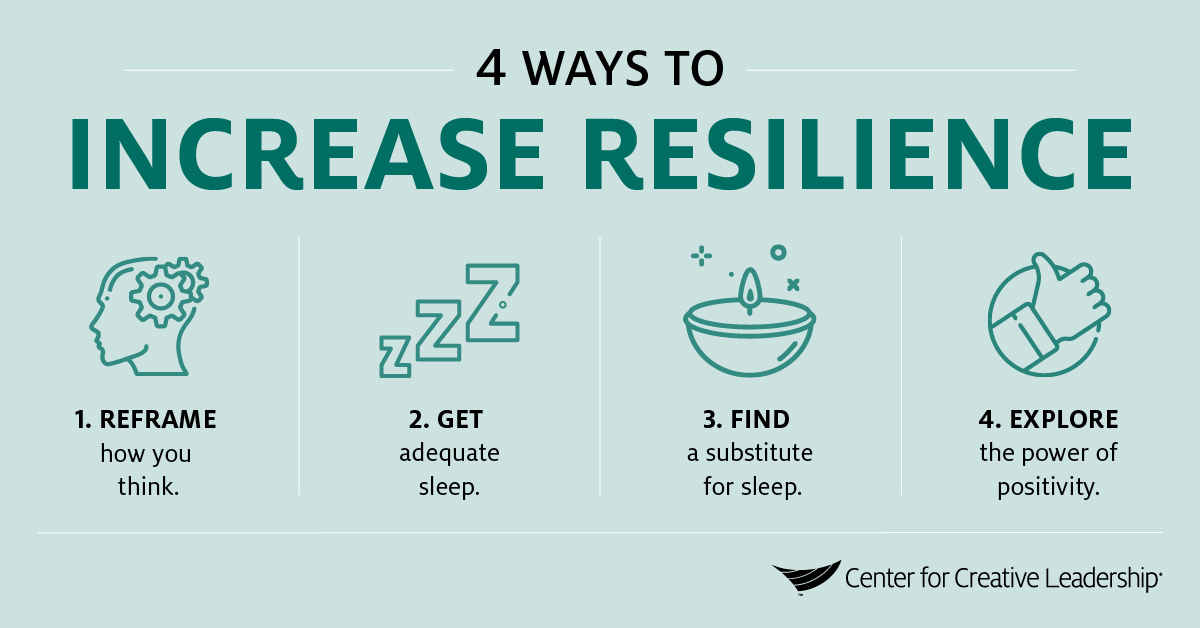Introduction
It’s a common myth that working harder is the best way to deal with the pressures of management. We like to think that extending work hours and multi-tasking are effective ways to be more effective at work. Yet, this thinking is flawed.
We know from studies of stress that performance doesn’t always increase as a result of putting more pressure on yourself. Pushing yourself too hard will just lead to overwork and burnout.
Additional pressure might lead to initial improvements, but then performance plateaus and ultimately may decline as the pressures associated with overwork increase. When crisis, industry volatility, societal shifts, or workplace pressures result in stress, it’s time to focus on building resilience as a leader: the ability to bounce back from obstacles and setbacks.
Too much pressure or stress creates narrowed thinking and increases the likelihood of flawed reasoning. It also turns on your body’s stress response, releasing a tsunami of chemicals and hormones.
Building resilience as a leader is necessary in today’s uncertain and volatile managerial world. The question is, how can you develop it?
As a first step, it’s helpful to identify those situations in which you feel overly pressured. What triggers those feelings?
Once you’re more attuned to what produces stress and feelings of pressure, you can then work on ways to build a personal reserve of resilience.

Dive deeper into 8 practices that keep you healthy, focused, and functioning with our book, Resilience That Works: Eight Practices for Leadership and Life.
4 Tips for Building Resilience as a Leader
Try These to Become More Resilient
There are many strategies you can use to build resilience, but these are the top 4:
1. Reframe how you think.
One of the most helpful tools in building resilience as a leader is to reframe a situation. This is where knowing what triggers your feelings of stress is helpful. When you get that feeling in your gut that you’re overloaded, threatened, or in conflict, think about other ways to characterize the situation. Positive self-talk is incredibly powerful when leading in uncertainty or difficult situations.
Reframing requires examining a situation from a different perspective and asking what else could be going on. For example, if a valued staff member resigns, you might focus on the loss, or you can choose to reframe it as a chance to hire new talent.
There are some basic questions you can ask yourself: “What are the benefits of this situation?” and “What might my interpretation of the situation be missing?”
Many of our programs can help you increase your resilience by offering an opportunity to rethink your situation and a chance to consider alternative perspectives on both your situation and your response to it.
2. Get some sleep.
We all know it offers numerous benefits, and sleep can make you a more productive leader, but many people in leadership positions are still willing to sacrifice some sleep to get more work done.
Yet, sleep is vitally important because it allows the brain to go from taking in new inputs to encoding, processing, and integrating the day’s experiences in a way that makes it available for future use.
Sleep is a built-in biological source of building resilience as a leader that many don’t fully utilize.
Adequate sleep can result in enhanced attention and creativity — 2 capacities needed in positions of leadership.
Access Our Webinar!
Watch our webinar, How to Promote Wellbeing at Work, and learn how to build a workplace culture that supports and promotes wellbeing for all employees.
3. Find a substitute for sleep.
Sometimes it’s impossible to get enough sleep. If you just can’t get what you need, take a restorative break during the day. Try a short nap, a walk, yoga, or break to meditate.
These practices take your attention away from the specific situation at hand and give your mind a chance to move beyond stressful thoughts, helping you in building resilience as a leader. Try mindfulness practices too; mindfulness is a simple way to lead better.
4. Explore the power of positivity.
Research by Barbara Fredrickson and others has demonstrated that positivity helps people recover from setbacks. Positivity is a broad term covering many positive emotions including love, joy, appreciation, hope, serenity, and amusement.
Researchers have found that when people are in positive states of mind, they think more broadly than when they’re in negative states of mind.
So, look for the good in any situation. Savor your feelings of joy and positivity so that they last. One way to do this is to keep a gratitude journal where you note the 3–5 things you are most grateful for on a daily basis. Giving thanks will actually make you a better leader.
Positive emotions can build sources of resilience that you can have in reserve when facing adversity at work.
You need resilience not just at work, but also in your personal life. Having this sort of inner strength is helpful for all that life can throw at you — divorce, losses, illnesses, and unexpected change.
Building resilience as a leader gives you the strength to bounce back and be at your best.
Ready to Take the Next Step?
Build your resilience as a leader and help your team to form habits that create conditions for peak performance with our resilience-building solutions, which will help you avoid burnout — and burn bright instead.








